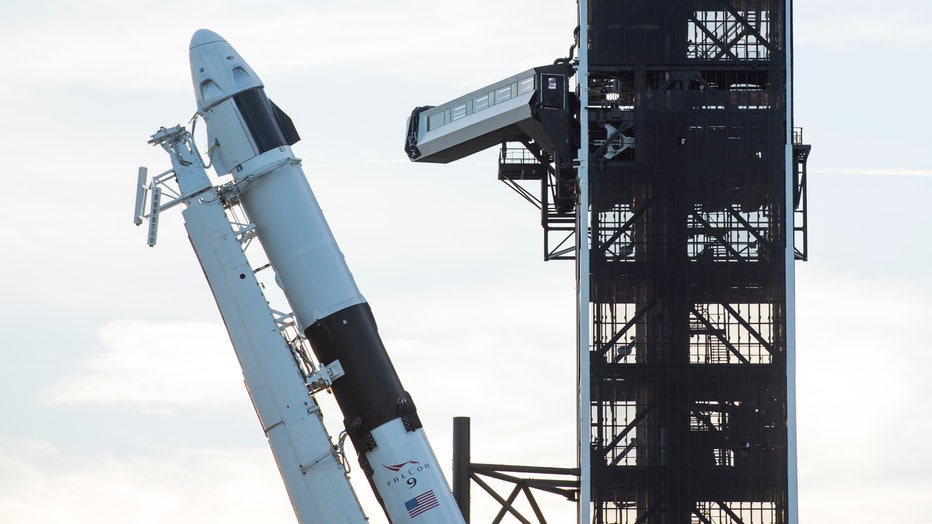ORLANDO, Fla. – Florida is gearing up for a busy 2025 in space exploration, with a packed schedule of rocket launches planned. From high-profile NASA missions to ambitious commercial projects, the launches are poised to push the boundaries of space exploration and technology.
Here is a list of the scheduled and projected missions for 2025:
January
Thuraya 4-NGS:
Thuraya 4-NGS is a communication satellite built by Airbus Defense and Space for the UAE-based Yahsat. The satellite will incorporate a 12-meter L-band antenna and a payload with on-board processing. This processing will provide advanced routing flexibility of up to 3200 channels with dynamic power allocation over many spot beams.
Rocket: SpaceX Falcon 9
Scheduled: January 2, 2025 | 12 a.m. – 12:53 a.m.
SpainSat NG I:
SpainSat NG I is the first of two ‘new-generation’ satellites built by Airbus. These satellites were created to secure communications with the Spanish government, their allies and other international organizations.
Rocket: SpaceX Falcon 9
Scheduled: January 27, 2025 | 11 p.m.
Blue Ghost Lunar Lander Mission 1 & Hakuto-R M2 “Resilience”:
Blue Ghost is a commercial lunar lander by Firefly Aerospace for NASA’s CLPS program. It can carry up to 155 kg of payload to the Moon and will land in the Crisium Basin’s Mare Crisium. The mission is designed to last 14 days before the lander succumbs to the lunar night.
Resilience is the second mission of the Hakuto-R lunar lander, developed by the Japanese company ispace. The lander will carry a small rover designed to study the Moon’s surface. As part of a 2020 NASA contract, the rover will also collect lunar soil (regolith) and transfer its ownership to NASA directly on the Moon.
Rocket: SpaceX Falcon 9
Projected: January 2025
Starlink Group 12-3:
A batch of satellites for the Starlink mega-constellation – SpaceX’s project for space-based Internet communication system.
Rocket: SpaceX Falcon 9
Projected: January 2025
February
Nova-C IM-2:
This will be the second mission for the Nova-C lunar lander, which was developed and built by Intuitive Machines. This mission will carry a NASA payload called PRIME-1, known as the “Polar Resources Ice Mining Experiment-1”. PRIME-1 is anticipated to be the first demonstration of in-situ resource utilization on the Moon. In-situ resource utilization is the practice of using materials found on other planets or moons to create consumables for human or autonomous activities.
Rocket: SpaceX Falcon 9
Scheduled: February 27, 2025 | Time TBD

CAPE CANAVERAL, FL: A SpaceX Falcon 9 rocket with the company’s Crew Dragon spacecraft onboard is seen as it is raised into a vertical position on the launch pad (Photo by Joel Kowsky/NASA via Getty Images). (Getty Images)
Bandwagon 3:
A dedicated rideshare mission delivering dozens of microsatellites and nanosatellites to a mid-inclination orbit, serving both commercial and government customers.
Rocket: SpaceX Falcon 9
Projected: February 2025
Transporter 13:
A dedicated rideshare mission transporting dozens of microsatellites and nanosatellites to a sun-synchronous orbit, supporting both commercial and government customers.
Rocket: SpaceX Falcon 9
Projected: February 2025
March
Crew-10:
SpaceX Crew-10 is the tenth crewed operational flight of a Crew Dragon spacecraft to the International Space Station as part of NASA’s Commercial Crew Program.
- Commander: Anne McClain (American)
- Pilot: Nichole Ayers (American)
- Mission Specialist: Kirill Peskov (Russian)
- Mission Specialist: Takuya Onishi (Japanese)
Rocket: SpaceX Falcon 9
Scheduled: March 25, 2025 | Time TBD
Blue Moon Pathfinder:
First flight of Blue Origin’s Blue Moon MK1 lunar lander which focuses on robotic exploration.
Rocket: Blue Origin New Glenn
Projected: March 2025

A Blue Origin New Shepard rocket launches from Launch Site One in West Texas north of Van Horn on March 31, 2022. The NS-20 mission carries Blue Origin’s New Shepard Chief Architect Gary Lai, Marty Allen, Sharon Hagle, Marc Hagle, Jim Kitchen, and Dr
Project Kuiper (Atlas V #2):
Project Kuiper is a mega constellation of satellites in Low Earth Orbit that will offer broadband internet access, this constellation will be managed by Kuiper Systems LLC, a subsidiary of Amazon. This constellation is planned to be composed of 3,276 satellites. The satellites are projected to be placed in 98 orbital planes in three orbital layers, one at 590 km, 610 km and 630 km altitude.
Rocket: United Launch Alliance Atlas V 551
Projected: March 2025
Fram2:
Fram2, the first astronaut mission to polar orbit, will launch from Florida aboard a Crew Dragon spacecraft, named after the Norwegian polar research ship Fram. The mission will reach a 90° circular orbit at an altitude of 425–450 km, marking the first human spaceflight over Earth’s polar regions from low-Earth orbit. Equipped with a cupola for Earth observation, the 3-to-5-day mission will study atmospheric phenomena like STEVE (Strong Thermal Emission Velocity Enhancement) and conduct research on the effects of spaceflight on the human body, including capturing the first x-ray images in space and examining behavioral health. The crew includes Chun Wang as mission commander, Jannicke Mikkelsen as vehicle commander, Eric Philips as pilot, and Rabea Rogge as mission specialist.
Rocket: SpaceX Falcon 9
Projected: March 2025
ViaSat-3 EMEA:
The ViaSat-3 series consists of three advanced Ka-band satellites designed to deliver exceptional service speed and flexibility. Each satellite is capable of providing over 1 Terabit per second of network capacity, with the ability to dynamically allocate bandwidth to areas with the highest customer demand.
Rocket: United Launch Alliance Atlas V 551
Projected: March 2025
Dragon CRS-2 SpX-32:
The 32nd commercial resupply mission to the International Space Station, operated by SpaceX under NASA’s second Commercial Resupply Services contract, will use the Cargo Dragon 2 spacecraft. It will deliver supplies and critical materials to support ongoing science and research aboard the orbiting laboratory.
Rocket: SpaceX Falcon 9
Projected: March 2025
April
Axiom Space Mission 4:
This mission is a Crew Dragon flight for Axiom Space. The mission will carry a professional commander and three astronauts to the International Space Station. The crew will stay aboard the space station for at least eight days.
Rocket: SpaceX Falcon 9
Projected: April 2025
May
Bandwagon 4:
This mission is a dedicated rideshare flight to a mid-inclination orbit with dozens of small microsatellites and nanosatellites for commercial and government customers.
Rocket: SpaceX Falcon 9
Projected: May 2025
Dream Chaser CRS 2 Flight 1:
First flight of the Dream Chaser Spaceplane to the ISS.
Rocket: United Launch Alliance Vulcan VC4L
Projected: May 2025
June
EscaPADE:
Blue Origin’s New Glenn launch vehicle will make its maiden flight, carrying the Escape and Plasma Acceleration and Dynamics Explorers (EscaPADE) mission. This dual-spacecraft mission will study ion and sputtered escape from Mars, aiming to understand the processes shaping Mars’ hybrid magnetosphere, how it directs ion flows, the transport of energy and momentum from the solar wind, and the flow of energy and matter into and out of Mars’ atmosphere.
Rocket: Blue Origin New Glenn
Projected: June 2025
Winter Park couple launches with Blue Origin
Blue Origin launched its ninth space tourism flight on Friday. A Winter Park couple was onboard that flight for their second trip to space.
WorldView Legion 5 & 6:
WorldView Legion is a constellation of Earth observation satellites built and operated by Maxar. Constellation is planned to consist of 6 satellites in both polar and mid-inclination orbits, providing 30 cm-class resolution.
Rocket: SpaceX Falcon 9
Projected: June 2025
O3b mPower 9-11:
Last three of a constellation of eleven high-throughput communications satellites in Medium Earth Orbit (MEO) built by Boeing and operated by SES.
Rocket: SpaceX Falcon 9
Projected: June 2025
Project Kuiper (Falcon 9 #1):
First of three launches apart of the contract for Amazon’s Kuiper low Earth orbit satellite internet constellation.
Rocket: SpaceX Falcon 9
Projected: June 2025
Transporter 14:
A dedicated rideshare mission to a sun-synchronous orbit with dozens of small microsatellites and nanosatellites that will be used by commercial and government customers.
Rocket: SpaceX Falcon 9
Projected: June 2025
Cygnus CRS-2 NG-22:
This mission falls under the Commercial Resupply Services contract with NASA. It will be the 22nd flight of the Northrop Grumman unscrewed resupply spacecraft Cygnus and the 21st flight to the International Space Station.
Rocket: SpaceX Falcon 9
Projected: June 2025
July
Crew-11:
SpaceX Crew-11 will be the eleventh crewed operational flight of a Crew Dragon spacecraft to the International Space Station. The mission is apart of NASA’s Commercial Crew Program.
Rocket: SpaceX Falcon 9
Projected: July 2025
MTG-S1:
Second of EUMETSAT’s third generation of weather satellite.
Rocket: SpaceX Falcon 9
Projected: July 2025
September
IMAP & other NASA payloads:
IMAP (Interstellar Mapping and Acceleration Probe) is a NASA mission to study interactions between solar wind and local interstellar medium. Carrying a suite of 10 scientific instruments, IMAP is able to investigate how particles are accelerated, their composition and can help to advance space weather forecasting models. The launch will also include several payloads from NASA.
Rocket: SpaceX Falcon 9
Projected: September 2025
KOMPSAT-7A:
KOMPSAT-7 and 7A are advanced follow-up satellites to KOMPSAT-3A, designed to provide high-resolution satellite imagery to meet the governmental and institutional needs of South Korea.
Rocket: SpaceX Falcon 9
Projected: September 2025
SpainSat NG II:
Second of two new-generation satellites built by Airbus to provide secure communications to the Spanish government, its allies, and various international organizations.
Rocket: SpaceX Falcon 9
Projected: September 2025
SpaceX uses giant arms to grab Falcon Heavy on landing
NASA and SpaceX launched the Europa Clipper spacecraft towards Jupiter on Monday, the largest spacecraft ever built for a planetary mission. A day earlier in Texas, SpaceX celebrated an engineering win — using giant metal arms to literally grab one of its Falcon Heavy Boosters mid-air after returning to Earth after a test flight.
October
Transporter 15:
Dedicated rideshare flight to a sun-synchronous orbit with dozens of small microsatellites and nanosatellites for commercial and government customers.
Rocket: SpaceX Falcon 9
Projected: October 2025
TSIS-2:
The Total and Spectral Solar Irradiance Sensor 2 (TSIS-2) is a NASA satellite that measures the Sun’s energy reaching Earth. It has two key instruments: the Total Irradiance Monitor (TIM), which measures the Sun’s overall brightness, and the Spectral Irradiance Monitor (SIM), which measures energy across different wavelengths covering 96% of the solar spectrum. These instruments are similar to those used in the TSIS-1 mission on the International Space Station.
Rocket: SpaceX Falcon 9
Projected: October 2025
Dragon CRS-2 SpX-33:
The 33rd commercial resupply mission to the International Space Station, operated by SpaceX, is part of NASA’s second Commercial Resupply Services contract. The Cargo Dragon 2 spacecraft will deliver supplies and payloads, including essential materials to support science and research conducted on the station.
Rocket: SpaceX Falcon 9
Scheduled: October 30, 2025
November
Griffin Mission One:
The Astrobotic Griffin lander will undergo a demonstration flight to test its capabilities and engines. This mission was originally planned for NASA’s now-canceled VIPER (Volatiles Investigating Polar Exploration Rover) mission.
Rocket: SpaceX Falcon Heavy
Projected: November 2025
SpaceX rocket launch of 23 Starlink satellites
SpaceX has launched another Falcon 9 carrying 23 Starlink satellites to low-Earth orbit from Space Launch Complex 40 (SLC-40) at Cape Canaveral Space Force Station in Florida.
Florida’s spaceports are at the heart of 2025’s exciting space missions. From ISS resupply flights to lunar landers and advanced satellites, the state continues to lead the way in space exploration. With more launches ahead, Florida’s skies will stay busy, driving us toward a bright future in space.


























/cdn.vox-cdn.com/uploads/chorus_asset/file/24924653/236780_Google_AntiTrust_Trial_Custom_Art_CVirginia__0003_1.png)




/cdn.vox-cdn.com/uploads/chorus_asset/file/25672934/Metaphor_Key_Art_Horizontal.png)

